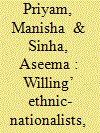|
|
|
Sort Order |
|
|
|
Items / Page
|
|
|
|
|
|
|
| Srl | Item |
| 1 |
ID:
154940


|
|
|
|
|
| Summary/Abstract |
A strong sense of victimhood, a discourse of social suffering, and complementary bodily performances, which mobilize rancor, resentfulness, and revengefulness, are fundamental elements of Turkish-Islamist ideology. This article discusses the political dynamics and implications of such assertions of victimhood in the Turkish context. To underscore these dynamics, it analyses the role of the logic of pain in the subject formation of Turkish-Islamist identity and how this logic has been revitalized by constitutive and hegemonic social imagination, and circulated and intensified by a reactionary mood. Additionally, it aims to expose how this reactionary mood profoundly depends on contradictory subjectification processes, which simultaneously involve mobilization of feelings of impotency, non-responsibility, self-pitying, and sublimation of power. This subject formation opens the way for identification with authoritarian figures in the Turkish case.
|
|
|
|
|
|
|
|
|
|
|
|
|
|
|
|
| 2 |
ID:
145980


|
|
|
|
|
| Summary/Abstract |
Through the lenses of contemporary terrorism, this article charts the rise of global resentment against the background of the multiplication and denial of failure. The article examines resentment and ressentiment as emotional responses to different kinds of failure: failure of justice and failure of recognition, respectively. It then investigates their place in the affective and moral economy of the global age, teasing out the key distinctions between the two emotions and assessing the strengths of the claim concerning an ever expanding diffusion of ressentiment in late modern times. Through inroads into classical and contemporary political theory, the article seeks to rescue resentment from the relative hegemony of ressentiment. The article closes with a reading of the Paris terror attacks of 7 January 2015 and 13 November 2015, that seeks to disentangle the different forms of resentment mobilised in these acts. By raising the issue of the moral value of resentment, the article ultimately seeks to address the question of how to cope with failure while holding on to emancipatory, counter-hegemonic, and self-affirming political practices.
|
|
|
|
|
|
|
|
|
|
|
|
|
|
|
|
| 3 |
ID:
179837


|
|
|
|
|
| Summary/Abstract |
This article provides a framework for thinking about incels and incel-inspired terrorism. Incels are part of a fringe online subculture that trades in misogyny, victimhood and fatalism. The aim of the article is to describe these aforementioned orientations and the emotions associated with them. Only a tiny minority of incels commit acts of incel-inspired terrorism. Research on shame and revenge provides a useful starting-point for understanding these acts.
|
|
|
|
|
|
|
|
|
|
|
|
|
|
|
|
| 4 |
ID:
193624


|
|
|
|
|
| Summary/Abstract |
Using evidence regarding the consolidation of Hindu nationalism in India we put forward new ethnographic data about the variety of popular support for a Hindutva project and a new framework that proposes an interactive theory of social identity. This framework helps us understand how Hindu nationalism becomes embedded in society. We assert that Hindu nationalism in India could be fruitfully analysed by focusing on the processes through which ideas of exclusive nationalism spread among ordinary middle-class people and are expressed in micro-level psychological changes at the individual level. The consolidation of Hindu nationalism in India is being authored not only by parties or the state, but also by societal actors, specifically, ordinary middle-class Indians. Hindu nationalism has been spreading in micro-public spheres in a time of apparent peace and between elections, and with the participation of willing supporters. Building on our fieldwork and research in psychology and history, our conversations have also helped us to identify profiles of different types of nationalists, which we categorize as willing ethnic-nationalists, hardliners, bystanders, and moderates. Further, we suggest the need to focus on inter-linked micro-level mechanisms such as diffusion and emulation of Hindu-centric beliefs and ideas, mobilization by hardliners and organizations, and impunity resulting from protection by state agencies, which helps to create willing ethnic-nationalists and sustains Hindu nationalism. Evidence regarding social interactions from a variety of survey organizations concurs with our findings and our ethnographic material allows us to delve deeper into varieties of Hindu nationalist support across diverse ordinary people.
|
|
|
|
|
|
|
|
|
|
|
|
|
|
|
|
|
|
|
|
|